One from the Heart Blu-ray Movie
HomeOne from the Heart Blu-ray Movie 
Lionsgate Films | 1982 | 107 min | Rated R | No Release Date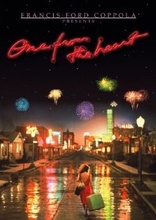
Price
Movie rating
7 | / 10 |
Blu-ray rating
| Users | 4.5 | |
| Reviewer | 2.0 | |
| Overall | 3.2 |
Overview
One from the Heart (1982)
Hank and Frannie don't seem to be able to live together anymore. After a five-year relationship, lustful and dreamy Fanny leaves down-to-earth Hank on the anniversary of their relationship. Each one of them meets their dream mate, but as bright as they may seem, they are but a stage of lights and colours. Will true love prevail over a seemingly glamorous passion? Welcome to Coppola's Broadway-like romantic musical.
Starring: Frederic Forrest, Teri Garr, Raul Juliá, Nastassja Kinski, Lainie KazanDirector: Francis Ford Coppola
| Drama | Uncertain |
| Romance | Uncertain |
| Musical | Uncertain |
Specifications
Video
Video codec: MPEG-4 AVC
Video resolution: 1080p
Aspect ratio: 1.34:1
Original aspect ratio: 1.37:1
Audio
English: DTS-HD Master Audio 5.1 (48kHz, 24-bit)
Music: DTS-HD Master Audio 5.1 (48kHz, 24-bit)
Subtitles
English, Spanish
Discs
50GB Blu-ray Disc
Single disc (1 BD)
Playback
Region A (B, C untested)
Review
Rating summary
| Movie | 3.0 | |
| Video | 1.0 | |
| Audio | 4.5 | |
| Extras | 5.0 | |
| Overall | 2.0 |
One from the Heart Blu-ray Movie Review
Heartsick.
Reviewed by Jeffrey Kauffman December 4, 2012Note: This film is currently available only in the box set Francis Ford Coppola: 5-Film Collection.
Hollywood and its denizens are famous (perhaps even infamous) for reinventing themselves, but there have
been few reboots as dramatic as the so-called New Hollywood that erupted in the late sixties and continued for another
decade or so, injecting the nearly moribund studio system with a dose of independent film spirit, somewhat akin to a
senior citizen deciding on a whim to smoke a joint or (heaven forfend) drop some acid (perhaps a perfect appropriate
metaphor, given certain proclivities during that time period). A lot of future icons burst into the mainstream during this
period, including several directors who would go on to legendary status. Among these are Martin Scorsese, Robert
Altman, George Lucas, and one man who perhaps best personifies that independent spirit, Francis Ford Coppola.
(Ironically, the most successful director of this “new” generation, Steven Spielberg, is considered to traditional to be
included in most lists of this movement.) Coppola earned his stripes in low budget fare like some Roger Corman
productions, but then after a couple of higher profile screenplay jobs (This Property is Condemned, Is Paris Burning?
) rather incredibly (even to him) was offered the decidedly mainstream film version of Finian’s Rainbow, a
musical that had one of the longest gestational periods in the history of Broadway to Hollywood translations (the
Broadway version opened in 1947, and the film arrived in 1968). The film musical, much like the studio system itself,
was a dying art form in the late sixties, and Finian’s Rainbow, despite being one of the more ebullient film tuners
of its day, died a quick death at the boxoffice, and Coppola found himself returning to screenplay writing for 1970’s
huge hit Patton. In the meantime
Coppola had jettisoned his attempts to work solely in the existing studio system and had begun work on what would
eventually become American Zoetrope, his private production company which not only brought out a number of high
profile Coppola films, but two early films by one of Coppola’s best friends, George Lucas (namely THX 1138 and American Graffiti). Once again irony was not about to let
Coppola be, and when he was hired to direct what was not especially a highly anticipated property, he turned The Godfather into one of the most
legendary films of all time and cemented his place among the greatest directors of his generation.
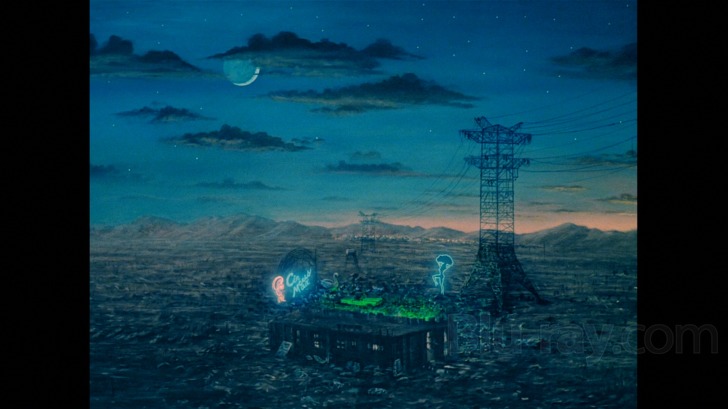
Coppola had experienced some of his greatest triumphs by the time One From the Heart was released in 1982, including the first Godfather sequel as well as Apocalypse Now, but the market appeal seemed to be off the director by the dawn of the new decade, and in fact this film is often cited as one of the death knells of the New Hollywood era. For someone who had proven at such a young age he was able to mount a rather credible musical, One From the Heart often seems a strangely disjointed affair, one which flirts with the traditional cinematic idea of what a musical should be without ever fully embracing the idiom. (It’s interesting to note —no pun intended— that fellow New Hollywood auteur Martin Scorsese had attempted something vaguely similar, albeit much more traditionally structured, with his 1977 New York, New York . And another director at least tangentially associated with New Hollywood, Peter Bogdanovich, had tried his own hand at fashioning a pastiche musical of sorts with his disastrous At Long Last Love in 1975.)
There are a number of ironies at work with regard to not just One From the Heart, but also vis a vis any director from New Hollywood, like Scorsese or Bogdanovich, attempting to make a musical. Musicals had always been the height of artificiality in cinematic terms (and even theatrically), with characters simply bursting into song on a veritable whim. While there had been some attempt to “normalize” this conceit in such iconic films as West Side Story, the whole premise of a musical would seem to be absolutely antithetical to the often down and dirty ethos of New Hollywood. In a sort of double irony, Hollywood had begun to react to the realism afforded by New Hollywood by tweaking some long held musical film tropes. In 1969’s musical version of Goodbye, Mr. Chips, for instance, what is otherwise a resolutely old fashioned tuner sought to gussy up the proceedings by having several songs “sung” as interior monologues the characters are experiencing, while montages or other “non singing, non dancing” action played out on screen. Coppola seemed to take that approach to heart (no pun intended) in One From the Heart, for even in some of the copious pre-release material he participated in that is offered on this Blu-ray as a supplement, he mentions repeatedly that One From the Heart isn’t “really” a musical (at least in a traditional sense), but more like a story told through music.
What is also odd about One From the Heart is how Coppola seeks to meld the extreme artificiality of the musical idiom—something that Coppola doesn’t just exploit, but actually enlarges in terms of a patently “fake” looking production design—with the “kitchen sink drama” story of lovers on the outs, the kind of quieter, more intimate story that was often favored by the New Hollywood group. It’s an often jarring juxtaposition that makes One From the Heart tonally (again, no pun intended) one of Coppola’s strangest pieces, a sort of quasi-hallucinatory experience that is interesting on an intellectual level but, again ironically, fails to speak to the heart.
In terms of plot, there’s simply not much “there” there. Teri Garr plays Frannie, a frustrated store window decorator (didn’t Rhoda do that on The Mary Tyler Moore Show?) who is aching for some excitement in her life as well as her five year romance with Hank (Frederic Forrest). The two break up and seek relationships elsewhere, Frannie with Ray (Raul Julia), a Vegas musician, and Hank with Leila (Nastassja Kinski), a circus worker (yes, a circus worker) passing through Vegas with her show. That’s basically the sum total of Coppola’s expository powers in One From the Heart, and it’s an awfully flimsy foundation on which to build something as substantial as the writer-director seems to want to do with this weirdly “little” big film.
Coppola’s choice of Tom Waits to handle the song score is endemic of what is fascinating, but also perhaps “wrong”, about One From the Heart. Many a pop songwriter has tried their hand at crafting musicals and has flamed out spectacularly, and while Waits had a perhaps easier time of it since his songs are used more or less as underscore or commentary, there’s still a disconnect between the kind of low scale glamour of Coppola’s approach and the gritty, almost “street”, ambience of Waits’ writing. As with so much else about One From the Heart, there’s something intrinsically interesting about the music, but nothing that actually deeply touches the emotions, something that Coppola obviously wanted to achieve, and which he has been so aptly able to do in his other, non-singing non-dancing, films.
One from the Heart Blu-ray Movie, Video Quality 
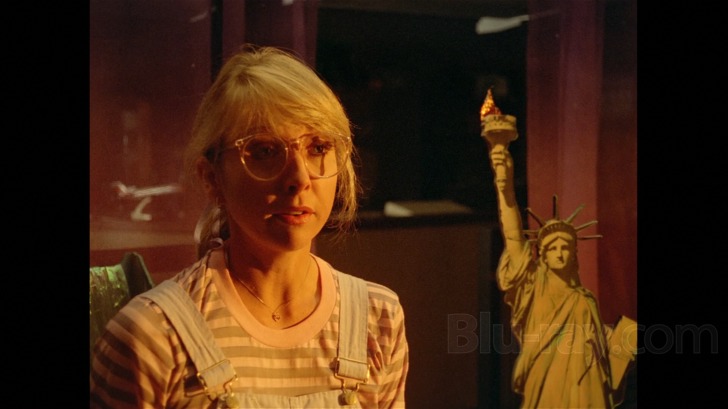
Something is very much awry with One From the Heart's AVC encoded 1080p transfer in 1.34:1, though it isn't clear yet whether this is simply a flaw on my particular disc or not (my hunch is it isn't, unfortunately). It may look to the naked eye like the screenshots accompanying this review are at least at the acceptable level of image quality. However, if you download the screenshots and then slightly enlarge them, you will see what appears to be a very strange anomaly, parallel vertical lines running through the image that look almost like very narrow banding, although they're not related to color gradation whatsoever—they remain consistently through the image no matter what's going on. On top of the "narrower" vertical lines are wider vertical areas that are slightly shaded with respect to each other; in other words, there's a wider, darker swath next to a slightly lighter swath extending alternately across the image. Two of our most technically astute staff members have looked at the screenshots in some detail and feel this may be due to a miscalibrated scanner, but my initial contact with the Coppola organization (which has been very forthcoming and is investigating the issue, as is Lionsgate reportedly) seems to think that's impossible, as original co-cinematographer Vittorio Storaro was evidently involved in this transfer in some capacity. I've personally never seen anything like it, and while the good news is it's not that visible while watching the film in motion, once you've become aware of it, you start to notice the bizarre crosshatched pattern that shows up especially on lighter colored backgrounds as if someone had thrown a mosquito net over the proceedings. This is not a screencapture unit malfunction, as all of the screencaptures for the entire Francis Ford Coppola: 5-Film Collection set were done at the same time (not to mention countless other reviews done prior to these two), and this anomaly has only shown up with One From the Heart, and, not to state the obvious, it can be seen while watching the film itself. (For a really noticeable example, go to approximately 49:08 in the film, when Julia and Garr are in the smoky nightclub, and the camera pans past Julia, who is backlit. Suddenly the entire frame is awash in vertical lines that make everything look pinstriped.) There are also some contrast issues which have been endemic to the film since its release and which are reproduced here, with sometimes milky blacks. The overall image is relatively soft, befitting the original theatrical appearance of the film. If and when more information becomes available on the vertical "banding" issue, it will be posted in the review.
One from the Heart Blu-ray Movie, Audio Quality 
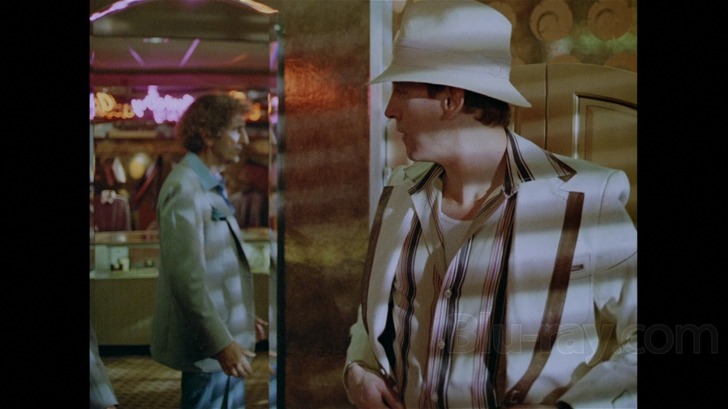
One From the Heart features two DTS-HD Master Audio 5.1 mixes, the original soundtrack of the film and an isolated score option. Both of these sound fantastic, albeit with a somewhat narrower soundfield than might be expected from a supposedly "flashy" musical. Tom Waits' score fills up the surrounds quite nicely, and his duets with Crystal Gayle are decently separated. Some of the crowd scenes, as in the big Las Vegas strip sequence, also feature good immersion, but the bulk of this film is really quieter dialogue segments and therefore doesn't provide a lot of "wow" factor, sonically speaking. Fidelity is top notch and dynamic range is quite wide.
One from the Heart Blu-ray Movie, Special Features and Extras 
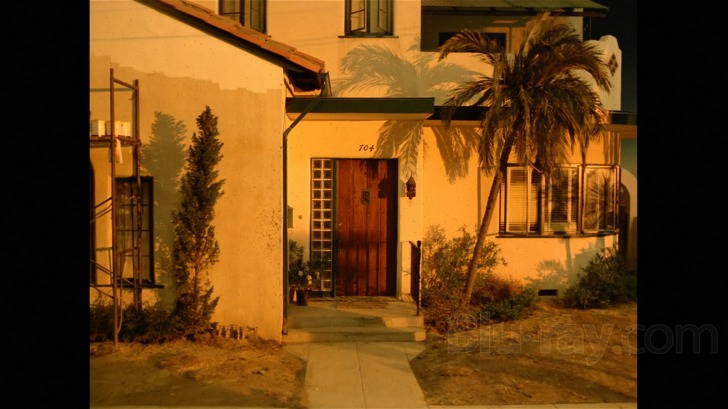
- Feature Commentary by Francis Ford Coppola. Coppola always makes for a fascinating commentator, and that holds true here, especially since this project was (to coin a phrase) one from his heart. There's a lot of technical information here in terms of how he handled the artificiality, as well as some cogent reminiscences of the business side of things which didn't exactly go well for the embattled impresario.
- The Dream Studio (HD; 29:37) is a loving homage to American Zoetrope which in effect becomes a biography of Coppola as well as a document of his conflicts with Paramount over One From the Heart.
- The Electronic Cinema (HD; 9:58) is a great little piece which proves what a prescient thinker Coppola was in terms of predicting the communications revolution and, in a way, our very own digital age. For a hearty laugh, watch the slightly incredulous Ali MacGraw trying to figure out what the frell Francis is talking about during the Academy Awards.
- Tom Waits and the Music of One From the Heart (HD; 14:03) takes a look at the idiosyncratic singer- songwriter.
- The Making of One From the Heart (HD; 24:19) is a good making of featurette with some great behind the scenes shots, including of some of the dance and music rehearsals.
- Deleted Scenes include:
- Early Opening Sequence with Director's Commentary (HD; 4:24)
- Frannie's Dream (HD; 1:09)
- Y.A. Tittle Time (HD; 1:05)
- Odd Little Boy Blue w/o effects (HD; 3:13)
- Little Boy Blue Alternate Version (HD: 1:29)
- Frannie and Hank Drive Home (Extended) (HD; 1:52)
- Early Version of Ending (HD; 2:19)
- Laundromat Meeting/Hank & Moe Meet Leila (with optional commentary) (HD; 1:53)
- Videotaped Rehearsals (HD; 6:55)
- The Tom Waits Score—Alternate Tracks includes audio of:
- Wages of Love – Uptempo (4:01)
- PIckin' Up After You – Early Demo with Edie Lehmann (3:23)
- I Beg Your Pardon – Take 1 (5:25)
- Candy Apple Red Bass Solo (1:05)
- Cold Chisel – Work in Progess (8:27)
- Take Me Home Waits Vocal (1:59)
- Press Conference at the Studio (HD; 7:51) stems from a February 4, 1981 screening of snippets from the film.
- Francis Coppola Speaks to the Exhibitors (HD; 1:30)
- This One's From the Heart Music Video (HD; 4:07)
- Stop Motion Demo (HD; 3:35)
- 1982 Theatrical Trailer (HD; 3:09)
- 2003 Theatrical Trailer (HD; 2:16)
One from the Heart Blu-ray Movie, Overall Score and Recommendation 
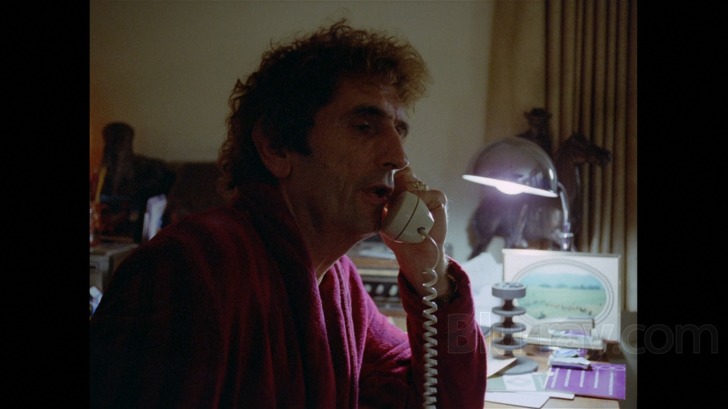
I've actually always had a soft spot in my heart for this film, despite this somewhat curmudgeonly review. I have in fact been really excited about the prospect of seeing it in high definition ever since Coppola archivist James Mockoski hinted it might be coming soon in our exclusive interview I conducted with him 2011. And it can't be denied that Coppola and Lionsgate have gone above and beyond by porting over everything from the deluxe DVD edition and upgrading it all to HD. But what oh what happened to the video transfer? I am hoping against hope I simply received some kind of bizarrely defective disc, but unfortunately my heart—the arbiter of all truth, as even Coppola knows—tells me otherwise. Until I receive information helping to explain what's going on, I unfortunately can't recommend this release, as much as I'd like to.
Similar titles
Similar titles you might also like
(Still not reliable for this title)

Tetro
2009

The Red Shoes 4K
1948

La La Land 4K
2016

Always
1989

Saawariya
2007

Moonrise Kingdom
2012

Dance, Girl, Dance
1940

Before Midnight
2013

The Tempest
Derek Jarman
1979

Knight of Cups
2015

Absolute Beginners
1986

My Blueberry Nights
2007

The Miracle Woman
1931

45 Years
2015

Stanley & Iris
1990

Call Me by Your Name
2017

Beauty and the Beast
La belle et la bête
1946

Nine
2009

Last Tango in Paris 4K
Ultimo tango a Parigi / Slipcover in Original Pressing
1972

The Deep Blue Sea
2011
